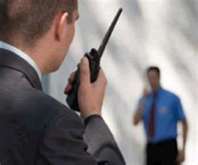Clear Communication Tips
 When an officer receives a message, does he (she) take the time to “play back” the information to the caller, or simply answer with “Yeah, I got that” and then forget it? Are there pink message pads or a computer log screen available that have the blank spaces for “caller”, “time”, “date”, “number”, “note”, and “operator”? And, after the call is completed, does the officer make an attempt to follow through by locating the recipient, or simply toss the message into the “in box” near the console?
When an officer receives a message, does he (she) take the time to “play back” the information to the caller, or simply answer with “Yeah, I got that” and then forget it? Are there pink message pads or a computer log screen available that have the blank spaces for “caller”, “time”, “date”, “number”, “note”, and “operator”? And, after the call is completed, does the officer make an attempt to follow through by locating the recipient, or simply toss the message into the “in box” near the console?
How about the famous “Oh, he knows who it is” or “No, I don’t want to leave a number-it’s unlisted!” These can frustrate the officer who attempts to complete the call. Add to this the wife or child calling with the tenth domestic emergency of the night- “Ask Jim to call me right away-my son smeared peanut butter in our VCR”. Now complete the daily routine with eight “Isn’t this Mario’s Pizza?” and you can see how the routine task of telephone message handling can become a frustration. (Remember-remain professional and approach each call in the same manner.)
Check Out: Incident Report Writing Guide
Radio messages are another challenge. Portable radios, even with speaker microphones attached, have to compete with noise from passing cars, screaming kids, and whatever else is happening while the officer is copying a transmission from base. Does the dispatcher take the time to phonetically spell out names and addresses? (“That’s R-Romeo-U-Uniform-N-November”). When numbers are used, are they run together or is a pause taken such as “044 ** 46 ** 6699”? And-the most frustrating cause of lost information- do you wait a few seconds before broadcasting or grab the mic and start talking right away? (A radio system needs time to “breathe” between transmissions, or else the beginning of each message will be cut out!)
 When speaking on the phone or radio, or taking a message, the officer should try to project a positive image. This helps the company, the supervisor, and the security staff to “satisfy the public”. Avoid prejudging a caller, or editing information based on your own emotions or experience. I have personally witnessed alarm accounts rescued from cancellation by prompt delivery of an irate client’s message to management. If you use pink pads, computer logs, or the well-known “officer’s notebook” in the field, taking down the correct information and relaying that data to the proper individual is a vital part of your duties in security or alarm dispatching.
When speaking on the phone or radio, or taking a message, the officer should try to project a positive image. This helps the company, the supervisor, and the security staff to “satisfy the public”. Avoid prejudging a caller, or editing information based on your own emotions or experience. I have personally witnessed alarm accounts rescued from cancellation by prompt delivery of an irate client’s message to management. If you use pink pads, computer logs, or the well-known “officer’s notebook” in the field, taking down the correct information and relaying that data to the proper individual is a vital part of your duties in security or alarm dispatching.
A final note- in the communications office, the Dictaphone recorder will allow the officer to play back a conversation to make sure that all pertinent information was obtained. In the field, the patrol officer does not have that luxury, and so asking base to “repeat the last message” or “Did you say A as in Alpha or J as in Juliet?” is recommended to complete the call. If there are noise or interference problems, ask the dispatcher to relay the message by telephone.
Clear communication skills will allow others to easily get relayed information for safety and security of all involved.
